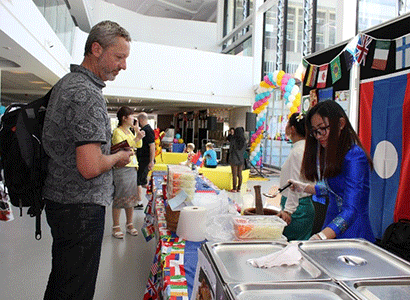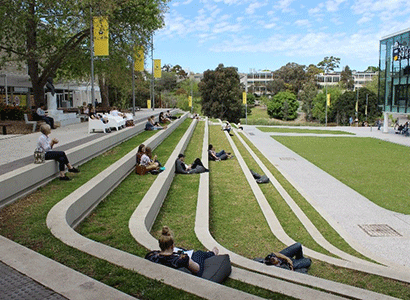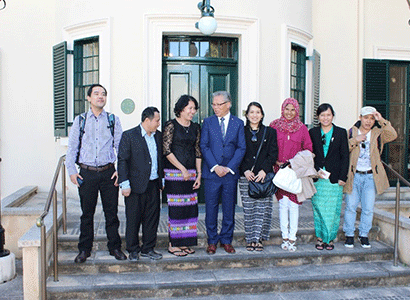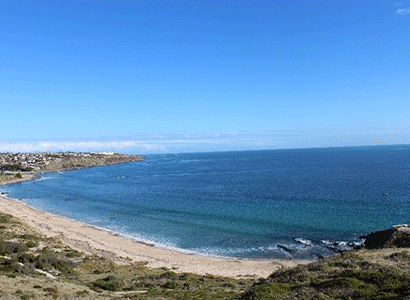Australia: a home away from home
 |
 |
| Lao students in Adelaide participate in annual multicultural festival at Flinders university. |
Flinders University in Adelaide, South Australia. |
This year marks the 70 th anniversary of Laos-Australia diplomatic relations. On this special occasion, as a former student under the Australia Award Scholarship programme, I am strongly motivated to share my feelings on what Australia means to someone like me, as well as how I have benefitted from my studies in Australia.
In 2016 and 2017, I had the great opportunity to study for a master’s degree in Public Administration (Management) at Flinders University in Adelaide, South Australia. During my two years in Australia, which is thousands of kilometres from Vientiane, this huge kangaroo country came to feel like my home away from home.
Arriving in Adelaide in early January 2016, the weather was extremely hot although not so humid. At first, I thought this would be a big disaster for me as I had never experienced such an extreme climate, but I soon came to realise that I could adapt to my new environment thanks to the availability of the information.
On my first day of orientation at the university, I was given a lot of information – about the weather, the facilities at the university, and the transport system – in fact everything I needed in order to get settled.
Adelaide is a small coastal city with a small population. But it has almost everything one could need, including modern education facilities, shopping centres, and of course, Lao and Thai food.
Most of the people in Australia are of European descent, while there are also Cambodian, Lao, Vietnamese and Thai migrants. Although Australian people can often be straightforward, they are generally very kind. They are generous and ready to help those in need of assistance.
One of the things that impressed me the most is Australia’s cultural diversity. Although there are people of many different ethnic backgrounds in the country, they live in harmony. This is probably the core value of Australian culture and politics. It seems that the Australians have learnt from the mistaken belief that the policies of white Europeans did not guarantee success and peace.
The education system taught me that it was important not just to remember facts, but to understand cause and effect, and the relationship between various factors. This method of teaching and learning greatly empowered my ability to analyse and to think critically.
There were many occasions when I talked to my lecturers in order to understand what needed to be done to get a good grade in my assignments. Most of the time, they did not just tell me to do this or that, but asked me what my plan was.
They would ask me questions about what I planned to do so that they could provide feedback and offer comments, so that I knew if I was on the right track and could complete the assignment successfully. I came to realise that their questions were carefully crafted so that they shed a light on the path I needed to take on my learning journey.
The Australian system of education taught me that I must learn to think independently. The clue to this type of learning is that you must fully understand the questions being asked and then go to the library do a lot of reading in order to find evidence to support your thesis.
In my mini research experience, Australian lecturers were very comfortable with formulating hypotheses, which requires proving a theory and assessing its value.
They were very supportive and encouraged me to do research that would challenge conventional thinking. They said that so long as I was able to provide sufficient evidence to support my hypothesis, I would get a high grade in the exam.
In my opinion, the Australian education system is world class thanks to the modern learning facilities and labs. The system is not designed to tell students exactly what to do, but to encourage students to make up their own minds and provide evidence to support their thesis. The role of the lecturers is to provide guidance, while it is up to the individual to prove they can evaluate and learn.
This taught me that we should not draw a conclusion unless we have enough solid evidence to support it. We also should not judge people who have different opinions, because there is always more than one way of viewing a situation. Instead of just pushing our own point of view in order to win an argument, we should understand the basis of the other person’s thinking, and realise that there is not necessarily a right or wrong answer.
One of the most important things I learnt is that one community’s solution to a problem does not necessarily suit the needs of another group because of their different environments and circumstances. Therefore, it is important for each community to explore ways to be successful, based on evidence and facts rather than emotion or sentiment.
If asked whether the Australian education system benefitted my personal growth and career development, I can say that I now feel much more confident about putting my ideas across and carrying them through, because I have a much better understanding of cause and effect. I also understand and respect people who have different points of view, as they are viewing the situation from a different perspective.
In the past I always wanted to win the battle of argument but now I take the approach that it is better to ask the other person if they have enough evidence to support their claim. I think this approach is more productive, as it gives me the opportunity to learn from them.
My time at university in Australia has also bolstered my leadership ability. I understand now that being a leader does not necessarily mean that I hold a high position, but have the ability to take new initiatives and lead the implementation of a proposed project.
So long as you can prove the success of a project, you can be a leader even if you hold a lower ranking. This concept may be at odds with the opinion held by the majority of people, who believe that a leader is a person in a high position.
In conclusion, during the two years of my master’s degree programme in Australia, I felt no pressure because of the fact that the country was thousands of kilometres from Laos. I felt that Australia was indeed a home away from home because of the kindness of the Australian people and the respect shown for diversity.
The Australian system of education empowered me because it equipped me with analytical thinking skills, which I can now use to explore ways to solve both my personal problems as well as social and national problems.
This article is written by Ekaphone Phouthonesy, a senior journalist and editor at the Vientiane Times. Ekaphone is an Australian Award Alumni with a Master’s Degree in Public Administration (Management) from Flinders University, Adelaide, Australia.
 |
 |
| South Australia Governor, Mr Hieu Van Le (2014-2021) poses with international students at annual farewell reception in 2017. |
Costal view of Adelaide city, South Australia. |
By Ekaphone Phouthonesy
(Latest Update May 25, 2022)
|